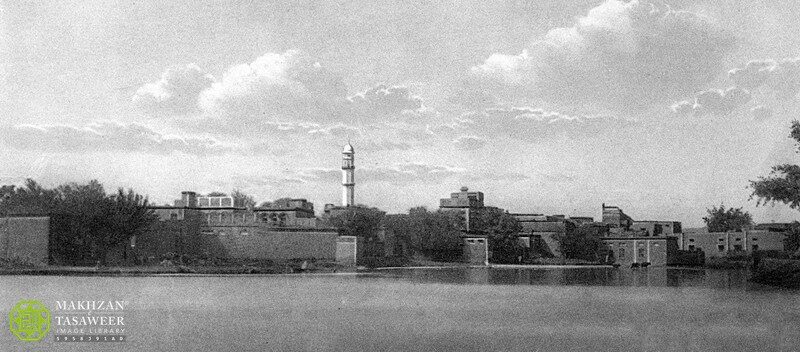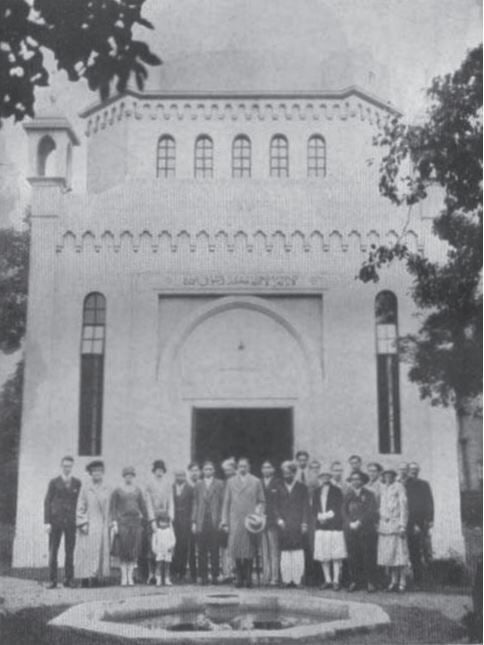A series looking at the high standard of morals of the Promised Messiahas and his Khulafa when receiving visitors in Qadian
Awwab Saad Hayat, Al Hakam

Sir Mian Fazl-i-Husain Sahib was born in Peshawar, India in 1877. He was one of the most influential politicians in the Punjab province of the British Raj and a founding member of the Unionist Party. He was instrumental in the planning of employment for Muslims in the Indian Civil Service and was called the “Father of Modern Punjab”. He introduced various schemes for the development and welfare of the people of Punjab. For example, while serving as Minister of Education, Member Board of Revenue and Member Executive Council Viceroy (for Education, Health and Land Affairs), he not only implemented costly reforms to protect the interests of the people of Punjab but, most importantly, he played an exemplary role in introducing laws. In particular, his invaluable services to the protection of the rights of the common people of Punjab, the working class and the labourers are not only commendable but also unforgettable.
Mian Fazl-i-Husain Sahib’s father’s name was Khan Bahadur Hussain Bakhsh Sahib. Khan Bahadur Hussain Bakhsh had reached very high and honourable positions in his government service. Mian Fazl-i-Husain received his early education from Government College, Lahore. Allama Iqbal was his classmate as well as a close friend. After completing his primary education, he went to England and from there returned to India with a law degree.
Mian Fazl-i-Husain Sahib visited Hazrat Ahmadas twice. On 14 September 1907 and then again in May 1908.
On his first visit, he was accompanied by Mian Hussain Bakhsh Sahib. There, during his visit, he met with the Promised Messiahas. A representative of the Jamaat’s newspaper, Al Hakam, recorded the details of this meeting. The Al Hakam correspondent wrote that during the conversation some things served as extremely effective proof of the living faith that Hazrat Ahmadas had in Allah Almighty.
During the conversation, Hazrat Ahmadas unveiled the secrets of national development and while highlighting the correct Islamic teaching in this matter, said:
“When Muslims make progress, they will do it with piety,” Hazrat Ahmadas said that the same God who helped Muslims make progress in its inception was the same God today. “Take my Jamaat for example,” Huzooras said. People had labelled the Promised Mesisahas a kafir, religious edicts were issued for his murder and an attempt to halt his message were made. The Promised Messiahas added that Muslims had turned against him and his Jamaat to the extent that a religious edict was issued that Muslims should not even meet with him and the Jamaat cheerfully. Then Hazrat Ahmadas said, “But you tell me, what was the result of this opposition? Now my Jamaat is close to 400,000 in which there are doctors, there are lawyers, there are traders, there are people from all walks of life. What effect has this opposition had?
خدا دارى چہ غم دارى
[What is grief, if God is yours!]
“It is my belief that man perishes by disassociating himself from God. However, as long as he does not abandon Him, even the entire world cannot do him any harm whatsoever […]”
According to the Badr newspaper dated 24 May 1908, it is written that during the last journey of the Promised Messiahas to Lahore, Sir Mian Fazl-i-Husain had the pleasure of meeting Huzooras again. There were two other lawyers with him on this occasion. By then, Mian Fazl-i-Husain had established a good reputation as a lawyer in Lahore.
The meeting took place at 10 am. Whilst conversing with these guests with regard to a particular matter, Huzooras said “Insha-Allah” and then added:
“It is very important to say Insha-Allah because not all matters of man are under his control. Man is surrounded by various kinds of calamities, unpleasantries, and obstacles. It may be possible that that which he has intended to do, he may not be able to fulfil. And so, by saying ‘Insha-Allah’, help is sought from Allah Almighty who is the source of all powers. Today’s irrational and ignorant people laugh at it.”
Whilst mentioning the advantage of the opposition faced by the Ahmadiyya Jamaat and the defeat of those who oppose the Jamaat, Huzooras said that all processes in cultivation play a role. Even with the usage of water and seeds, manure is needed. So, in the same way, Huzooras said, unjust opposition serves as fertilizer for the Jamaat.

The Promised Messiahas then stated the purpose of forming a Jamaat and explained the differences with other Muslims. Highlighting various issues, Huzooras openly said that receiving [non-law bearing] revelation from Allah Almighty was still possible and that Allah Almighty was not mute, as the majority of the Muslim ummah believed.
During this meeting, a guest asked Huzooras about the reality of Shaq-ul-Qamar (the splitting of the moon).
Huzooras said:
“In our opinion, it was a kind of eclipse. We have written about this in our book, Chashma-e-Ma‘rifat.”
Then Hazrat Ahmadas was asked about the reality of the Miraj, and about the uniqueness of Jamaat-e-Ahmadiyya among the existing sects of Muslims.
Fazl-i-Husain Sahib submitted that if all non-Ahmadis were labelled as disbelievers, there would be nothing left in Islam. Hazrat Ahmadas said:
“We do not deem any person who believes in the Kalima as a person outside the pale of Islam until such a one calls us a kafir and [and in doing so] himself becomes a kafir. You may not be aware, when I claimed to be appointed [by Allah], then Muhammad Hussain of Batala, Maulvi Abu Saeed prepared a fatwa [religious edict] with great effort in which it was written [alluding to Hazrat Ahmadas] that ‘this person is a kafir, dajjal, misguided. His funeral prayer should not be offered, whoever says “as-salamu ‘alaikum”, greets him, or calls him Muslim is also a kafir’. You see, it is a matter of consensus that whoever calls a person a kafir, he himself, becomes a kafir. So how can we deny this matter […] Such a one who does not call us a kafir, we do not call them a kafir at all. However, if those who call us kafir, [and in doing so] we should not consider them as kafir, then that is to oppose the hadith and the agreed-upon issue, and this we cannot do.”
Then, on being asked what the issue was if one offered salat with those who do not oppose Hazrat Ahmadas a kafir, Huzooras said:
لاَ يُلْدَغُ الْمُؤْمِنُ مِنْ جُحْرٍ وَاحِدٍ مَرَّتَيْنِ
“[A believer may not be bitten twice from the same hole]. We have had many experiences [with them] such people are actually hypocrites. Their condition is:
وَاِذَا لَقُوا الَّذِىۡنَ اٰمَنُوۡا قَالُوۡۤا اٰمَنَّا ۚۖ وَاِذَا خَلَوۡا اِلٰى شَىٰطِىۡنِہِمۡ ۙ قَالُوۡۤا اِنَّا مَعَكُمۡ ۙ اِنَّمَا نَحۡنُ مُسۡتَہۡزِءُوۡنَ
[Surah al-Baqarah, Ch.2: V. 15]
“In other words, they say in front of us that ‘we have no opposition with you’, but when they are alone with their ringleaders, they say that ‘we were only mocking’. So, if these people make an announcement that ‘we consider the people of the Ahmadiyya Jamaat to be believers, and that those who call them kafirs are themselves kafirs’, then I shall order my Jamaat, today, to pray alongside them […]”
The person who asked the previous question retorted and asked his question again. Huzooras then explained:
“First ask your clerics what view they have of me. They say that ‘he is such a disbeliever that his disbelief is greater than that of the Jews and the Christians.’ Thus, just as when the message of release [from jail] reached Yusuf, peace be upon him, he said, ‘First ask them what my fault is?’ Thus, [is my case] before reconciliation, ask them [clerics] as to which aspect of disbelief [they see in me]. In all that we do and say, is an expression of the greatness, honour and respect of the Holy Prophet, peace and blessings of Allah be upon him.”
In the same session, Huzooras was asked about his views on women›s education and about which type of employment was best. The Promised Messiahas answered that the employment which stopped a person from acting or doing prohibited things was a blessing and the employment that caused a person – or provided him with the opportunity to do bad – was damnable employment.

